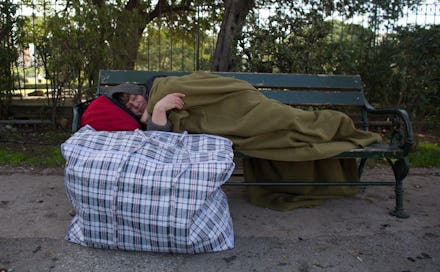California Mayor Has the Worst Possible Solution to Homelessness

Here are some ways to alleviate the pain the of homeless people who live in your city: Provide them with services for survival and rehabilitation, provide them with temporary housing, provide them with permanent housing or tell them to go away and hope they don't bother you anymore.
The mayor of San Rafael, California, appears to have chosen the last strategy.
On Friday, the city announced it would be closing a large public park for at least a month in order to restore its conditions — and rid it of its homeless population.
"I want to break the cycle so this is not a place for [the homeless] to hang out," Mayor Gary Phillips told Marin News. "I want to return this place to the community and have some family-friendly events here."
"They sit here, have their methamphetamine and go get a meal at St. Vincent de Paul [a nonprofit organization that provides services for the needy]," Phillips said.
Phillips' action is in response to community complaints that the park has become less inviting as homeless people have chosen to drink, use drugs and litter in the area. Police also suspect a homeless person was responsible for a fire in a park restroom last week.
Marin News spoke with some members of the local homeless community, and some complained that his rhetoric and policy was painting an unfair portrait of the largely unobtrusive crowd that tends to gather there, and that one bad apple has caused a headache for the rest of them.
The mayor said the city is working with St. Vincent de Paul to ascertain the people causing problems at the park and work with them.
Phillips' would be wise to focus on the provision of services rather than attempting to displace the homeless population by cutting off public spaces or stigmatizing the homeless people who rely on them for survival.
Ordinances restricting encampments, public food-sharing and other activities that a homeless person needs to survive have been passed in close to 200 cities in the past few years, and they've done nothing to resolve the underlying problems that cause homelessness in the first place.
Some cities and states have defied this trend of sweeping homelessness under the rug and instead focused on providing housing. Utah has taken extraordinary steps to provide housing for its chronically homeless population, and it's been a remarkable success. New Orleans has housed all of its homeless veterans. These kinds of housing-first policies work because a majority of people who experience sustained homelessness typically suffer from deep physical and mental health issues that local, ad hoc shelters and kitchens can hardly fix. It also happens to cost the state less by reducing the emergencies that inevitably accompany sustained homelessness.
Phillips should indeed attempt to "break the cycle" with its homeless population — by devoting greater resources to housing them.